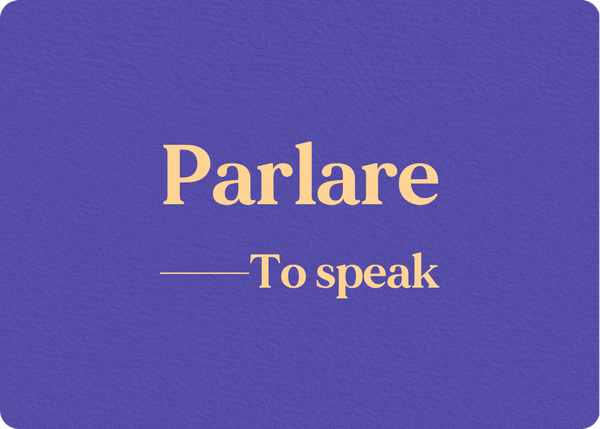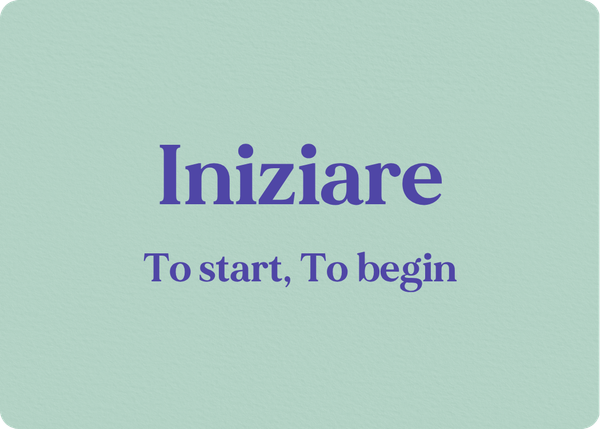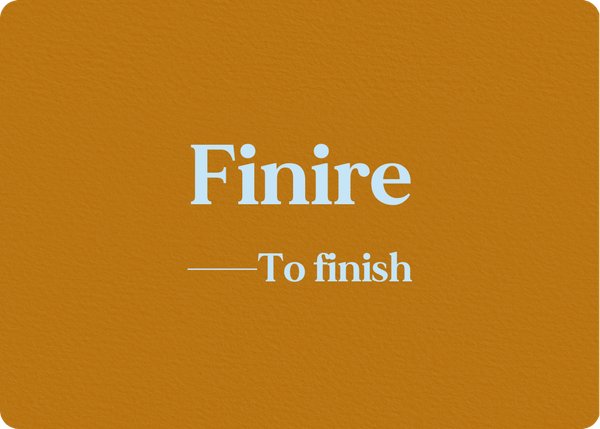What is Parlare?
Parlare is an Italian verbs meaning "to speak" or "to talk". It belongs to the first conjugation (-ARE verbs) and follows regular patterns. This verb is useful for expressing communication, conversation, and speech, and is one of the most frequently used verbs in Italian conversation and writing.
Key Features of Parlare:
- Type: Regular first conjugation verb (-ARE)
- Meaning: To speak, to talk, to communicate
- Auxiliary verb: Uses "avere" (to have) for conjugation in compound tenses
- Past participle: Parlato
Indicativo – Indicative Mood
Presente (Present Tense)
| Person | Conjugation |
|---|---|
| io | parlo |
| tu | parli |
| lui/lei | parla |
| noi | parliamo |
| voi | parlate |
| loro | parlano |
Example:
Emilia parla quattro lingue.
Emilia speaks four languages.
Passato Prossimo (Present Perfect)
| Person | Conjugation |
|---|---|
| io | ho parlato |
| tu | hai parlato |
| lui/lei | ha parlato |
| noi | abbiamo parlato |
| voi | avete parlato |
| loro | hanno parlato |
Example:
Ieri io e Paola abbiamo parlato al telefono per ore.
Yesterday Paola and I talked on the phone for hours.
Imperfetto (Imperfect)
| Person | Conjugation |
|---|---|
| io | parlavo |
| tu | parlavi |
| lui/lei | parlava |
| noi | parlavamo |
| voi | parlavate |
| loro | parlavano |
Example:
Da ragazzo, parlavo sempre di calcio con i miei amici.
When I was a kid, I always talked about soccer with my friends.
Trapassato Prossimo (Past Perfect)
| Person | Conjugation |
|---|---|
| io | avevo parlato |
| tu | avevi parlato |
| lui/lei | aveva parlato |
| noi | avevamo parlato |
| voi | avevate parlato |
| loro | avevano parlato |
Example:
Avevano parlato a lungo prima di trovare un accordo.
They’d talked for a long time before reaching an agreement.
Passato Remoto (Simple Past)
| Person | Conjugation |
|---|---|
| io | parlai |
| tu | parlasti |
| lui/lei | parlò |
| noi | parlammo |
| voi | parlaste |
| loro | parlarono |
Example:
Parlai senza paura, dicendo finalmente ciò che pensavo.
I spoke without fear, finally saying what I really thought.
Trapassato Remoto (Past Anterior)
| Person | Conjugation |
|---|---|
| io | ebbi parlato |
| tu | avesti parlato |
| lui/lei | ebbe parlato |
| noi | avemmo parlato |
| voi | aveste parlato |
| loro | ebbero parlato |
Example:
Dopo che ebbe parlato, tutti rimasero in silenzio.
After he had spoken, everyone remained silent.
Futuro Semplice (Simple Future)
| Person | Conjugation |
|---|---|
| io | parlerò |
| tu | parlerai |
| lui/lei | parlerà |
| noi | parleremo |
| voi | parlerete |
| loro | parleranno |
Example:
Domani parleremo con il professore.
Tomorrow we will talk with the professor.
Futuro Anteriore (Future Perfect)
| Person | Conjugation |
|---|---|
| io | avrò parlato |
| tu | avrai parlato |
| lui/lei | avrà parlato |
| noi | avremo parlato |
| voi | avrete parlato |
| loro | avranno parlato |
Example:
Quando arriverai, avrò già parlato con tutti.
When you arrive, I will have already spoken with everyone.
Congiuntivo – Subjunctive Mood
Presente (Present Subjunctive)
| Person | Conjugation |
|---|---|
| che io | parli |
| che tu | parli |
| che lui/lei | parli |
| che noi | parliamo |
| che voi | parliate |
| che loro | parlino |
Example:
Riteniamo che lui parli troppo in certe situazioni.
We believe that he talks too much in certain situations.
Passato (Past Subjunctive)
| Person | Conjugation |
|---|---|
| che io | abbia parlato |
| che tu | abbia parlato |
| che lui/lei | abbia parlato |
| che noi | abbiamo parlato |
| che voi | abbiate parlato |
| che loro | abbiano parlato |
Example:
È possibile che voi abbiate parlato con le persone sbagliate.
It's possible that you spoke with the wrong people.
Imperfetto (Imperfect Subjunctive)
| Person | Conjugation |
|---|---|
| che io | parlassi |
| che tu | parlassi |
| che lui/lei | parlasse |
| che noi | parlassimo |
| che voi | parlaste |
| che loro | parlassero |
Example:
Vorrei che tu parlassi più lentamente.
I’d like you to speak more slowly.
Trapassato (Past Perfect Subjunctive)
| Person | Conjugation |
|---|---|
| che io | avessi parlato |
| che tu | avessi parlato |
| che lui/lei | avesse parlato |
| che noi | avessimo parlato |
| che voi | aveste parlato |
| che loro | avessero parlato |
Example:
Se avesse parlato prima, avremmo capito subito.
If he/she had spoken earlier, we would have understood immediately.
Condizionale – Conditional Mood
Presente (Present Conditional)
| Person | Conjugation |
|---|---|
| io | parlerei |
| tu | parleresti |
| lui/lei | parlerebbe |
| noi | parleremmo |
| voi | parlereste |
| loro | parlerebbero |
Example:
In un’altra situazione parlerei più liberamente.
In a different situation, I’d speak more freely.
Passato (Past Conditional)
| Person | Conjugation |
|---|---|
| io | avrei parlato |
| tu | avresti parlato |
| lui/lei | avrebbe parlato |
| noi | avremmo parlato |
| voi | avreste parlato |
| loro | avrebbero parlato |
Example:
Avrei parlato di più, ma non volevo annoiare nessuno.
I would’ve talked more, but I didn’t want to bore anyone.
Imperativo (Imperative)
| Person | Conjugation |
|---|---|
| (tu) | parla |
| (lui/lei) | parli |
| (noi) | parliamo |
| (voi) | parlate |
| (loro) | parlino |
Example:
Parla più forte, non ti sento!
Speak louder, I can't hear you!
Indefinite Moods
Infinito (Infinitive)
- Presente (Present): parlare (to speak/talk)
- Passato (Past): avere parlato (to have spoken/talked)
Examples:
Mi piace parlare con te.
I like talking with you.
Aver(e) parlato con lui mi ha aiutato molto.
Having spoken with him helped me a lot.
Participio (Participle)
- Presente (Present): parlante (speaking) - used as adjective or noun (speaker)
- Passato (Past): parlato (spoken/talked) - used also as adjective or noun
Examples:
Ogni parlante aveva un accento diverso.
Each speaker had a different accent.
La lingua parlata dai giovani è ricca di espressioni nuove.
The spoken language of young people is rich in new expressions.
Gerundio (Gerund)
- Presente (Present): parlando (speaking/talking)
- Passato (Past): avendo parlato (having spoken/talked)
Examples:
Parlando con lei ho capito tutto.
Speaking with her I understood everything.
Avendo parlato con il medico, ora sono più tranquillo.
Having spoken with the doctor, I'm now calmer.
The verb Parlare at a glance: Key tenses you need
| Present | Present Perfect | Imperfect | Present Subjunctive | Imperfect Subjunctive | Present Conditional |
|---|---|---|---|---|---|
| io parlo | io ho parlato | io parlavo | che io parli | che io parlassi | io parlerei |
| tu parli | tu hai parlato | tu parlavi | che tu parli | che tu parlassi | tu parleresti |
| lui/lei parla | lui/lei ha parlato | lui/lei parlava | che lui/lei parli | che lui/lei parlasse | lui/lei parlerebbe |
| noi parliamo | noi abbiamo parlato | noi parlavamo | che noi parliamo | che noi parlassimo | noi parleremmo |
| voi parlate | voi avete parlato | voi parlavate | che voi parliate | che voi parlaste | voi parlereste |
| loro parlano | loro hanno parlato | loro parlavano | che loro parlino | che loro parlassero | loro parlerebbero |
Conclusion
Mastering the conjugation of "parlare" is useful for expressing communication, conversation, and speech in Italian. This regular first conjugation verb follows standard patterns in all tenses and moods, making it an excellent model for learning the -ARE verb conjugation system.
Remember the key points:
- Uses "avere" as auxiliary verb
- Completely regular in all tenses and moods
- Past participle is "parlato"
- Essential for expressing communication and speech
Keep practicing with practical sentences and concrete examples to gain confidence in using this Italian verb.





